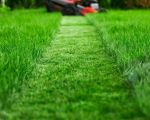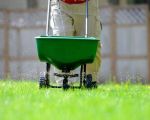
- Understanding-Sustainable-Lawn-Care
- Organic-Methods-For-Lawn-Maintenance
- Water-Conservation-Techniques
- Soil-Health-And-Natural-Fertilizers
- Long-Term-Benefits-Of-Sustainable-Practices
- How-Lawn-Care-Services-Can-Help
1. Understanding Sustainable Lawn Care
Adopting sustainable lawn care practices means more than just maintaining a visually appealing yard; it involves nurturing your lawn in ways that protect the environment and promote long-term health. Sustainable lawn care integrates eco-friendly lawn maintenance techniques, minimizing chemical usage and conserving natural resources. At its core, this approach encourages using natural processes to support a resilient, thriving lawn.
Many homeowners overlook the impact traditional lawn care has on ecosystems — from chemical runoff affecting waterways to excessive water consumption during dry months. Understanding these environmental consequences is the first step toward shifting to green lawn practices that benefit both your yard and the planet.
1.1 What Makes Lawn Care Sustainable?
Sustainable lawn care combines organic lawn care methods, water conservation, and soil health management. This approach limits synthetic fertilizers and pesticides, encourages biodiversity, and reduces carbon footprint. By fostering natural resistance to pests and diseases, it helps create a lawn that is easier to maintain and healthier in the long run.
2. Organic Methods for Lawn Maintenance
Organic lawn care is central to sustainability. Rather than relying on chemical fertilizers and herbicides, organic methods use natural products and techniques to enhance lawn growth and resilience.
One practical example is the use of compost and mulch, which enrich the soil naturally and improve moisture retention. Aeration is another important practice, as it promotes better air and water flow to grassroots, strengthening them without synthetic additives.
A real-life case from a suburban neighborhood in Oregon illustrates the effectiveness of organic lawn care. Homeowners who switched to organic practices reported fewer pest problems and thicker grass within two growing seasons, along with reduced water bills — a testament to sustainable lawn care's cost-effectiveness.
2.1 Avoiding Harmful Chemicals
Choosing organic pest control options, like neem oil or beneficial insects, helps maintain the ecosystem balance. Overuse of chemical pesticides can kill beneficial bugs, leading to more severe pest outbreaks and soil degradation. Thus, integrating organic lawn care not only supports the health of your lawn but also contributes to broader environmental well-being.
3. Water Conservation Techniques
Water is a precious resource, and adopting sustainable lawn care means using it wisely. Proper irrigation strategies significantly reduce water waste and promote a drought-resistant lawn.
Smart watering schedules—such as early morning or late evening irrigation—minimize evaporation. Installing drip irrigation or using rain sensors can further optimize water use. Additionally, selecting drought-tolerant grass varieties reduces overall water demand.
3.1 Real-World Success with Efficient Watering
A homeowner in Arizona shared how shifting to a xeriscaping approach and adjusting watering habits cut their lawn's water consumption by nearly 40%. This change not only saved money but also maintained a vibrant lawn despite the harsh climate. Stories like this highlight the practical benefits of sustainable lawn care tailored to local conditions.
4. Soil Health and Natural Fertilizers
Healthy soil is the foundation of a sustainable lawn. Rather than relying on synthetic fertilizers, which can damage soil microbes and lead to nutrient imbalances, natural fertilizers like compost, bone meal, and seaweed extracts nourish the lawn while preserving soil integrity.
Maintaining proper soil pH and encouraging microbial life supports nutrient cycling and promotes grass growth. Regular soil testing can help homeowners understand what their lawn needs and avoid over-fertilization, a common mistake in lawn care.
4.1 Enhancing Soil with Sustainable Practices
For example, a community garden project in California improved soil quality by integrating organic matter and practicing crop rotation. Though not a traditional lawn, the principles apply: improved soil health reduces dependency on artificial products and supports stronger plant life.
5. Long-Term Benefits of Sustainable Practices
Adopting sustainable lawn care is an investment in your lawn's future. Beyond environmental benefits, it results in lower maintenance costs, reduced water bills, and a healthier outdoor space for families and pets.
Moreover, sustainable lawns contribute to biodiversity by providing habitats for beneficial insects and pollinators. They also reduce pollution and greenhouse gas emissions, aligning your lawn care routine with global efforts to combat climate change.
5.1 Building Resilience Against Climate Challenges
With increasingly unpredictable weather patterns, sustainable lawn care offers a buffer against drought, heat, and disease. Lawns that rely on natural methods adapt better and recover faster, ensuring your yard stays green and healthy season after season.
6. How Lawn Care Services Can Help
Transitioning to sustainable lawn care can feel overwhelming, especially for busy homeowners. Professional Lawn Care Services offer tailored solutions that integrate eco-friendly lawn maintenance practices with expert knowledge. They provide guidance on organic treatments, water conservation strategies, and soil health improvements.
By consulting with these experts, homeowners can receive customized plans that fit their lawn’s unique needs, climate, and soil conditions. This approach ensures a smooth adoption of sustainable lawn care without the trial-and-error frustrations.
If you want to explore the best sustainable lawn care products, tools, or professional services, consider visiting Lawn Care Services for expert recommendations designed to help you maintain an eco-friendly and beautiful lawn.








